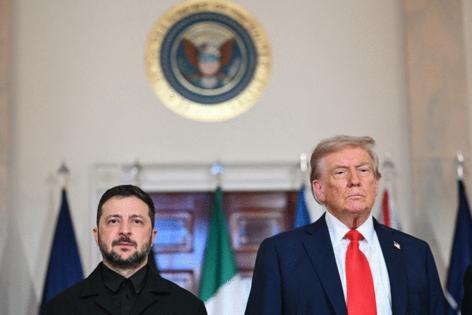Commentary: Trump's Russia and Ukraine summits show he can push for peace
Published in Op Eds
By hosting an unprecedented short-notice summit with Ukraine’s President Volodymyr Zelenskyy and key European leaders on Monday, President Donald Trump significantly raised the prospects for ending Russia’s three-and-a-half-year-long war against Ukraine.
The vibe at the opening was affable and positive. The participants genuinely looked determined to work out compromises that only a few weeks ago appeared illusory. It was a good sign for long-term Euro-Atlantic security cooperation in the face of challenges that, in Trump’s words, we have not faced since World War II. Toward the end, Trump’s call to Moscow brought a follow-up U.S.-Ukraine-Russia summit within reach.
But the rising expectations also reveal formidable obstacles on the path to peace. As the world’s leaders were heading to Washington, Russian leader Vladimir Putin’s forces unleashed 182 infantry assaults, 152 massive glide bombs, more than 5,100 artillery rounds and 5,000 kamikaze drones on Ukraine’s defenses and 140 long-range drones and four Iskander ballistic missiles on Ukraine’s cities. The attacks claimed at least 10 civilian lives, including a small child. This is how Russia attacks Ukraine daily, signaling disrespect for Trump’s diplomacy.
The Monday summit also revealed that Putin’s ostensible concession at the Alaska summit to agree to international security guarantees for Ukraine is a poisoned chalice. On the surface, it seemed like a breakthrough toward compromise. The White House summit participants jumped on it and put the guarantees at the center of discussions.
And yet there has been no agreement, and the world has more questions than answers. How could the Ukrainian armed forces be strengthened to deter Russia? Who would pay? How could Russia be prevented from rebuilding its Black Sea Fleet and blocking Ukrainian grain exports? What troop deployments would be needed? Who would put boots on the ground in Ukraine? What kind of guarantees should match what kind of territorial concessions?
Such questions are fraught with complex debates. Between the U.S. and Europe. Within Europe. Within the Trump administration. Within Ukraine. And all of that even before having to negotiate the issue with the Kremlin. The net outcome of the past week’s diplomatic huddles will be Putin buying time for his aggression as Washington abstains from sanctions hoping for peace.
Disingenuously, in exchange for this poisoned chalice of a concession, Putin demanded that Ukraine should cede not only lands currently under Russia’s illegal military occupation but also a large piece of the Donetsk province still under Kyiv’s control. That area is home to 300,000 people and is a major defense stronghold. Controlling it would give Russia a springboard to deeper attacks targeting big cities and threatening to bring Ukraine to its knees.
Putin’s offer also threatens to tear apart Ukraine’s society. In my tracking poll with Ukraine’s Academy of Sciences Institute of Sociology completed in early August, close to half of 567 respondents want Ukraine to reassert control over all of its internationally recognized territories, including the Crimean peninsula illegally annexed in 2014. Only 20% would be content with freezing the conflict along the current front lines. The option of ceding territories to Russia still under Kyiv control is so outrageous that it was not included in the survey. Eighty percent of Ukrainians continue to have faith in Ukraine’s victory and to see democracy and free speech — core values Putin would take away — as vital for Ukraine’s future.
Getting Ukrainian society right is important for Trump’s peace effort to succeed. Discounting Ukrainians’ commitment to freedom and independence has a lot to do with where we are now. Putin launched the all-out invasion in February 2022 expecting Ukrainians to embrace Russian rule. Then-President Biden assessed that Ukrainians would fold quickly and delayed major military assistance to Kyiv.
Misjudging Ukrainians now would most likely result in a rejection of peace proposals and possibly a political crisis there, inviting more aggression from Moscow while empowering more dogged resistance to the invasion, with a long, bloody war grinding on.
Thankfully, Trump has the capacity to keep the peace process on track. First, he can amplify two critically important messages he articulated at the Monday summit: U.S. willingness to back up Ukraine’s security guarantees and to continue to sell weapons to Ukraine if no peace deal is reached.
Second, he can use his superb skills at strategic ambiguity and pivot back to threats of leveraging our submarine power and of imposing secondary sanctions on countries trading with Russia.
Third, he can drop a hint he’d back up the Senate’s bipartisan Supporting Ukraine Act of 2025, which would provide military assistance to Ukraine over two years from confiscated Russian assets, the U.S.-Ukraine minerals deal proceeds and investment in America’s military modernization.
The Monday summit makes the urgency of these and similar moves glaringly clear.
____
Mikhail Alexseev, a professor of international relations at San Diego State University, is the author of “Without Warning: Threat Assessment, Intelligence, and Global Struggle” and principal investigator of the multiyear “War, Democracy and Society” survey in Ukraine.
_____
©2025 Los Angeles Times. Visit at latimes.com. Distributed by Tribune Content Agency, LLC.
























































Comments